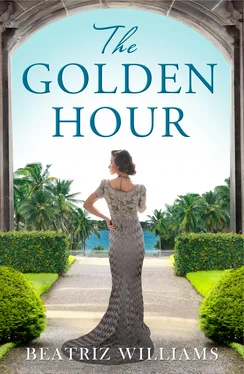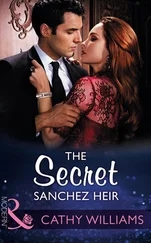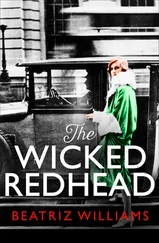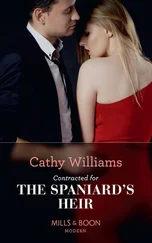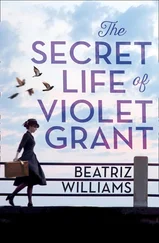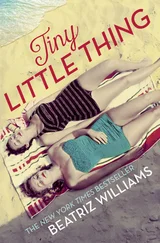“You heard me,” said the boozer. “Scram.”
He spoke more loudly now, close to shouting, and his voice rang above the noise of the engine. People glanced our way, over their newspapers and magazines, and glanced back just as quickly. Nobody wanted trouble, not with a drunk. You couldn’t tell what a drunk might do, and here we flew, two miles above the ocean in a metal tube. I myself had begun to perspire. The sweat trickled from my armpits into the sleeves of my best blouse of pale blue crepe, my linen jacket. The boozer was getting angrier, despite the soothing, conciliatory nature of the Englishman’s voice, or maybe because of it. The force of his anger felt like a match in the act of striking, smelled like a striking match, the tang of saltpeter in your nose and the back of your throat. My fingers curled into the seams of my pocketbook.
“I’m afraid not,” said the Englishman.
The boozer looked like he was going to reply. He gathered himself, straightened his back, turned his head. His cheeks were mottled. The Englishman didn’t move, didn’t flinch. The boozer opened his mouth and caught his breath twice, a pair of small gasps. Then he closed his eyes and slumped forward, asleep. The Englishman removed his hand from the boozer’s shoulder and bent to sling the slack arm over his own shoulders.
“I’ll just escort this gentleman to his seat, shall I?” he said to me. “I’m awfully sorry for the trouble.”
No one spoke. No one moved. The stewardess stood in the aisle, braced on somebody’s headrest, hand cupped over mouth, while the Englishman hoisted the unconscious man to his feet and bore him— dragged him, really—toward the empty seat in the second row. The airplane found a downdraft and dropped, recovered, rattled about, dropped again. The Englishman lurched and caught himself on the back of the single seat to the left, third row. He apologized to the seat’s owner and staggered on. The stewardess then dashed forward and helped him lower the boozer into his seat like a sack of wet barley. Together they buckled him in, while the elderly woman to his right looked on distastefully. (I craned my neck to watch the show, believe me.)
Nobody knew what to say. Nobody knew quite what we had just witnessed. The engines screamed on, the airplane rattled like a can of nails. Across the aisle, a man in a suit of pale tropical wool turned back to his magazine. In the row ahead of me, the woman leaned to her husband and whispered something. I checked my watch. Only four minutes had passed, imagine that.
BY THE TIME THE ENGLISHMAN returned to his seat, the roar of the engines had deepened into a growl, and the airplane had begun to stagger downward into Nassau. A cloud wisped by the window and was gone. I feigned interest in the magazine, while my attention poured through the corner of my left eye in the direction of my neighbor, who picked his hat from the floor—it had fallen, apparently, during the scuffle or whatever it was—and placed it back in the bin. It turned out, his hair wasn’t thoroughly gold; there was a trace of red in the color, what they call a strawberry blond. I turned a page. He swung into place and reached for the newspaper, which I had retrieved and slid into the cloth pocket on the seat before him. It seemed like the least I could do, and besides, I can’t abide a messy floor.
“Thank you,” he said. “I do hope you weren’t troubled.”
“Not at all.”
He didn’t reply. I had a hundred questions to ask—foremost, was the boozer still alive—but I just turned the pages of the magazine in rapid succession until I ran out of paper altogether and closed the book on my lap, front cover facing up, THE WINDSOR TEAM locked in eternal amity with their Union Jack sofa pillows. The loudspeaker crackled and buzzed, something about landing shortly and the weather in Nassau being ninety-two degrees Fahrenheit, God save us.
I cleared my throat and asked the Englishman what brought him to Nassau, business or pleasure.
“I live here, in fact,” he said. “For the time being.”
“Oh! So you were visiting Florida?”
“Yes. My brother lives in a town called Cocoa, up the coast a bit. Lovely place by the ocean.” He nodded to the magazine. “Doing your research, are you?”
“Not exactly,” I said. “It was just a coincidence.”
“Ah.”
The airplane shook. I looked out the window and saw land, shrubby and verdant, and a long, pale beach meeting the surf, and a car flashing brilliantly along a road made of gray thread. “What a pair of romantics,” I heard myself say.
“Romantics? Do you really think so?”
I turned my head back and saw a serious profile, a pair of eyes squinted in thought behind the wire-rimmed spectacles. He hadn’t touched the newspaper. His lanky arms were folded across his chest, his right leg crossed over his left, immaculate, civilized. He didn’t look as if he’d lifted a pair of boots, let alone two hundred pounds of slack human weight.
“Don’t you? But it’s the love story of the century, hadn’t you heard?” I said. “The king who gave up his throne for the woman he loves.”
“A thoroughly modern thing to do. Not romantic at all.”
“How so?”
The airplane shuddered and thumped, bounced hard and settled. I looked out the window again and saw we had landed. The landscape outside teemed with color and vegetation and shimmering heat. I saw a cluster of palms, a low, rectangular building.
By the time we rolled to a stop, I had forgotten the question left dangling between us. The sound of his voice surprised me, but then everything about him had surprised me.
“A romantic would have sacrificed love for duty,” said the Englishman, “not the other way around.”
The airplane gave a final lurch and went still. He rose from his seat, removed his suitcase and his hat from the bin, removed my suitcase and gave it to me, and put his hat on his head. I said thank you. He told me to think nothing of it and wished me a good day, a pleasant stay in Nassau, and walked off the airplane. The sunshine flashed from the lenses of his spectacles.
As I passed the fellow from Savannah, he was still slumped in his seat, held in place by the safety belt, and I couldn’t honestly tell if he was dead or alive. The stewardess kept casting these anxious glances at his chest. I told her thank you for a memorable flight.
“Wasn’t it though,” she said. “Have a pleasant stay in Nassau.”
IN THE TERMINAL BUILDING, AS I waited my turn at the passport desk, I looked around for the blond man, but I didn’t see him. He might have gone anywhere. He might have come from anywhere. A fellow like that, he was like a djinn, like an enchanted creature from a fairy tale. Except this wasn’t a fairy tale, this was reality. He was made of common clay. He came from a woman and man, who fell in love, or had not. Who had married, or had not. Had spent a lifetime of nights together, or just one.
As I trudged out the terminal building to the street outside, I remember thinking a vast history lay behind this man, which I would never know.
ELFRIEDE
JULY 1900
(Switzerland)
THE ENGLISHMAN ARRIVES at the clinic about an hour after lunchtime, while Elfriede sits in the main courtyard with Herr Doktor Hermann, discussing something she dreamed the night before. When she looks back on this moment, from a distance of years and—eventually— decades, she will remember nothing about the dream or the discussion, but she will hear the exact noise of the cartwheels and the iron hoofbeats on the paving stones of the drive as if the interior of her head were a phonograph disc, and these sounds imprinted it forever. She’ll remember the voices rising from the other side of the courtyard wall, and the smell of the pink, half-wild roses climbing that wall, and the way the sun burst free from the shade to warm the back of her neck and soak the courtyard in light.
Читать дальше
